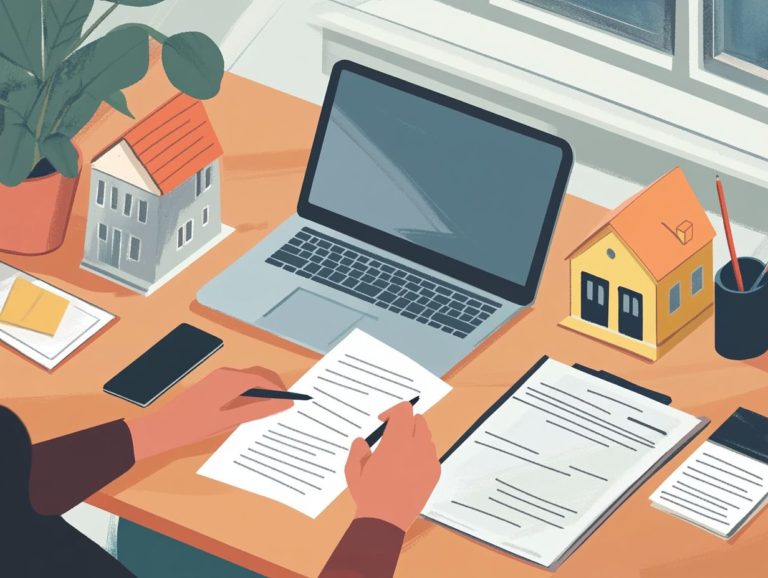What is Home Insurance? Your Essential FAQ
Home insurance is more than just a safety net; it s an essential part of being a responsible homeowner. Understanding what home insurance entails can save you from financial turmoil during unexpected events.
This guide walks you through the various types of coverage available and the factors that affect your premiums. It also offers tips for choosing the right policy tailored to your unique needs.
Whether you re a first-time buyer or reassessing your current coverage, this guide equips you with the insights you need.
Contents
Key Takeaways:
- Home insurance protects your home and belongings from financial loss due to unexpected events such as fire or theft.
- It s crucial for safeguarding your investment and providing peace of mind in case of a disaster!
- When choosing a home insurance policy, consider your coverage needs and compare quotes from different providers to find the best deal.
Understanding Home Insurance
Understanding the details of home insurance is essential for homeowners like you. It covers a range of options, including homeowners insurance, renters insurance, and mortgage company requirements for adequate coverage.
This protection not only defends your personal belongings but also provides personal liability coverage. By investing in the right policy, you ensure peace of mind while safeguarding yourself against unforeseen events and potential claims.
What is Home Insurance?
Home insurance, often referred to as homeowners insurance, is an essential safeguard for your property. It protects you against damages from events like fire, theft, or natural disasters, making it crucial to understand why you need home insurance.
This coverage extends beyond just the structure of your home; it also shields your personal belongings, ensuring that your furniture, electronics, and clothing are covered in times of need.
Many policies come with liability protection, which is invaluable if someone gets injured on your property and decides to make a legal claim against you. Insurance companies evaluate risk through various factors, including your location, the value of your property, and your history as a homeowner.
These assessments determine the premiums you’ll pay, reflecting the level of coverage and risk involved. You can explore options such as actual cash value or replacement cost coverage, allowing you to customize your protection to fit your financial needs.
Why is Home Insurance Important?
Home insurance is essential for you as a homeowner. It acts as a safety net, providing crucial financial protection against unexpected events that could damage your property or lead to liability claims.
It shields the physical structure of your home and safeguards your financial interests, especially since mortgage requirements often mandate such coverage.
When a covered event occurs, understanding the claims process is vital. It can significantly affect how quickly and efficiently you recover your losses.
Knowing your policy limits and specific coverage details enables you to make informed decisions, ensuring you are well-protected against potential gaps that could lead to substantial out-of-pocket expenses. Therefore, grasping these elements is key to maintaining both your peace of mind and your financial security.
Types of Home Insurance Coverage
You have a variety of home insurance coverage options, including homeowners insurance and renters insurance. There are also specialized policies tailored to meet specific coverage needs.
You can find extra coverage options for enhanced protection.
Basic Coverage
Basic homeowners insurance typically covers crucial elements such as property damage, personal belongings, and liability insurance for potential accidents on your property.
This coverage protects the structure of your home against risks like fire, theft, and vandalism. It extends to detached structures, such as garages or sheds, and includes personal property think furniture, electronics, and clothing up to a specified limit.
It s important to be aware of common exclusions, such as damage from floods and earthquakes, and to understand that certain items, like jewelry and fine art, may have coverage limits.
Taking the time to review your policy ensures that all bases are covered, providing you with the peace of mind and financial security you deserve.
Don t wait! Review your home insurance policy today to ensure you re fully protected!
Additional Coverage Options
Along with basic coverage, you can enhance your protection with additional options tailored to specific risks, like flood or earthquake damage, and coverage for high-value items.
These extra policies bolster your financial security, ensuring unexpected events don t lead to overwhelming losses. For instance, if you live in a flood-prone area, flood insurance may be essential.
If you also live in a seismic zone, consider earthquake coverage to protect your investment. Assessing your personal belongings that exceed typical coverage limits can help you secure protection for valuable items like jewelry or art.
By evaluating your personal needs and local risks, you can customize your coverage, balancing comprehensive protection with affordability.
Factors Affecting Home Insurance Premiums
Several factors determine your home insurance premiums, including the property’s location, the type of home you own, and the deductible options available.
Each of these elements significantly impacts your insurance rates and overall costs.
Location and Property Type
The location of your property and its type greatly influence your insurance premiums. If your home is in a flood-prone area, you may face higher insurance rates due to the increased risk.
Urban areas with high crime rates also lead to increased insurance costs, as insurers consider the likelihood of theft, vandalism, or damage.
For example, a single-family home in a bustling city might have vastly different premiums compared to a similar property in a quieter suburb. Additionally, condominiums with shared spaces may have varying insurance costs based on building management and shared area risks.
Ultimately, both the location and type of your property are vital in determining your insurance rate.
Personal Factors
Your claim history and credit score can significantly impact your insurance premiums, as insurers assess risk using these criteria.
A record of frequent claims may indicate higher risk, prompting insurers to raise your premiums. Conversely, maintaining a clean claim history showcases your responsibility and can lead to discounts or lower rates.
A higher credit score typically results in lower insurance costs, reflecting reliability and stability.
To manage these factors effectively, strive to:
- Think twice before filing a claim save it for when you really need it!
- Maintain a budget to improve your credit score over time.
- Regularly monitor your credit reports for accuracy.
By taking these proactive steps, you can enhance your chances of securing better premiums.
How to Choose the Right Home Insurance Policy
Selecting the ideal home insurance policy requires careful assessment of your coverage needs. Compare quotes from various providers and engage with insurance representatives to ensure comprehensive protection for your home.
This approach not only safeguards your investment but also provides peace of mind knowing you re well-covered.
Evaluating Coverage Needs
Assessing your coverage needs is crucial to ensure your home insurance policy protects your property and personal liability, especially if you own high-value items.
Begin by calculating the total value of your home and any significant investments, like antiques or high-end electronics.
If you have a valuable art collection, you might need extra coverage to protect against theft or damage something standard policies often overlook.
It s also important to evaluate potential liability risks. If your property features a swimming pool or spacious deck, consider raising your liability limits for possible accidents.
Conducting a thorough home inventory and consulting with an insurance advisor can provide insights into necessary adjustments, ensuring comprehensive and tailored protection.
Ready to safeguard your home? Contact an insurance expert today!
Comparing Quotes and Providers
Comparing quotes from different insurance providers is essential. It helps you find a policy that offers great coverage at competitive prices.
To make a smart choice, explore the details of each policy. Look beyond the cost; check the coverage details and limits as well.
When evaluating insurance providers, check their reputation and customer service ratings. Choosing a provider with excellent service can lead to a much more satisfying experience.
This means that when you need to file a claim, you ll have reliable support, making the process smooth.
Frequently Asked Questions
What is Home Insurance?
Home insurance covers your home and its contents against damage, theft, or other losses. It protects you financially from unexpected expenses.
What does Home Insurance cover?
Home insurance usually covers the structure of your home and personal belongings. It also covers liability for injuries or property damage to others.
Do I need Home Insurance?
Home insurance isn t required by law, but it s highly recommended. It provides financial protection against events that could lead to costly repairs.
How much does Home Insurance cost?
The cost varies based on your home’s location, size, and age, as well as your coverage limits. Don’t miss out shop around and compare quotes to find the best price.
What is the difference between Home Insurance and Homeowners Insurance?
Home insurance and homeowners insurance are similar. Home insurance is a broader term for both homeowners and renters, while homeowners insurance covers those who own their home specifically.
How can I save money on Home Insurance?
You can save money by bundling your home insurance with auto insurance from the same company. You might also save by increasing your deductible and installing safety features in your home.





